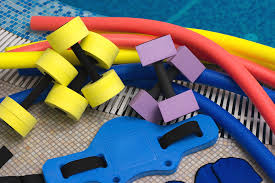
Why it so much fun to exercise in water? It’s because getting into the pool means leaving the world of gravity and entering the world of buoyancy! Buoyancy is the upward force that water exerts on submerged objects. It makes you feel lighter. It takes the weight off your joints. It allows you to jump higher and land softly. It supports you and reduces any fear you might have of falling. It reminds you of the fun you had playing in the pool as a child.
Buoyancy is one of the properties of water that can be harnessed to increase the intensity of your exercise. Any movement toward the pool floor has to work against buoyancy. So instead of focusing on arm lifts, press those arms down, either from the front in a double-arm press-down or from the side in a lat pull-down. In a front kick, focus on pressing the leg down. When kicking side to side, focus on pulling the legs down toward center.
Buoyancy is not the only property of water that makes working in water different from working on land. Water offers more resistance than air and it slows movement quickly. This resistance is called drag resistance. If you increase the surface area you increase the drag resistance. You can increase the surface area by traveling forward with the arms stretched to the side or by traveling forward with the legs farther apart. Increase frontal resistance while traveling sideways by performing exercises that move front to back, such as cross-country ski.
When you push against the water, the water pushes back. If you push harder, the water pushes back harder. This hard pushing is called acceleration. If you push hard enough to double the speed of your movement, you have quadrupled the force. You can therefore control the intensity of your exercise by the amount of force you use with your limbs. It is important to maintain your range of motion with acceleration, since small moves are not as effective for increasing intensity.
When you move a limb in one direction, it will propel the body in the opposite direction. For example, if you sweep your arms to the right, the reaction is that the body moves toward the left. This is called action and reaction. Swimmers use this property of water with their swim strokes. In vertical water exercise we can take advantage of this property to increase intensity by using impeding arm or leg movements. Sweep your arms to the right and move right. Use an arm or leg movement that propels the body forward, but travel backward. Or use an arm or leg movement that propels the body backward, but travel forward.
It is important to understand the properties of water because they make aquatic exercise very different from working on land. They are tools that can be used to increase intensity. And they add to the fun of working out in the water!
See you in the pool!

Chris Alexander

 Water exercise has many benefits, some of which were highlighted in my last Blog post. In this post I would like to focus on the benefits for your heart.
Water exercise has many benefits, some of which were highlighted in my last Blog post. In this post I would like to focus on the benefits for your heart.



